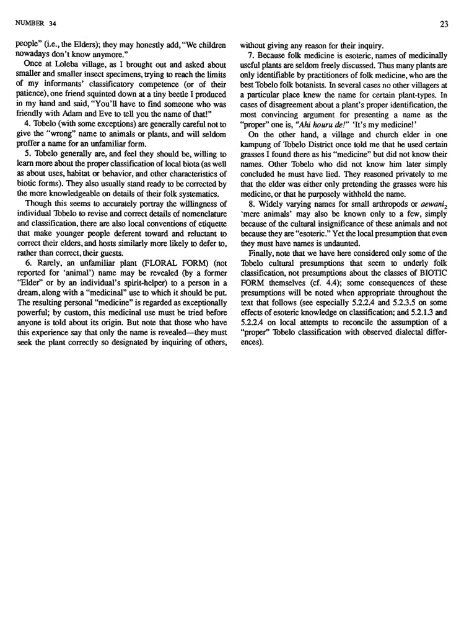The Folk Biology of the Tobelo People - Smithsonian Institution ...
The Folk Biology of the Tobelo People - Smithsonian Institution ...
The Folk Biology of the Tobelo People - Smithsonian Institution ...
Create successful ePaper yourself
Turn your PDF publications into a flip-book with our unique Google optimized e-Paper software.
NUMBER 34 23<br />
people" (i.e., <strong>the</strong> Elders); <strong>the</strong>y may honestly add, "We chUdren<br />
nowadays don't know anymore."<br />
Once at Loleba viUage, as I brought out and asked about<br />
smaUer and smaller insect specimens, trying to reach die limits<br />
<strong>of</strong> my informants' classificatory competence (or <strong>of</strong> <strong>the</strong>ir<br />
patience), one friend squinted down at a tiny beetle I produced<br />
in my hand and said, "You'd have to find someone who was<br />
friendly with Adam and Eve to teU you die name <strong>of</strong> that!"<br />
4. <strong>Tobelo</strong> (witii some exceptions) are generaUy careful not to<br />
give <strong>the</strong> "wrong" name to animals or plants, and wUl seldom<br />
pr<strong>of</strong>fer a name for an unfamiliar form.<br />
5. <strong>Tobelo</strong> generally are, and feel tiiey should be, willing to<br />
learn more about die proper classification <strong>of</strong> local biota (as weU<br />
as about uses, habitat or behavior, and otiier characteristics <strong>of</strong><br />
biotic forms). <strong>The</strong>y also usually stand ready to be corrected by<br />
die more knowledgeable on details <strong>of</strong> tiieir folk systematics.<br />
Though this seems to accurately portray die wUlingness <strong>of</strong><br />
individual <strong>Tobelo</strong> to revise and correct details <strong>of</strong> nomenclature<br />
and classification, <strong>the</strong>re are also local conventions <strong>of</strong> etiquette<br />
that make younger people deferent toward and reluctant to<br />
correct tiieir elders, and hosts similarly more likely to defer to,<br />
ra<strong>the</strong>r than correct, tiieir guests.<br />
6. Rarely, an unfamiliar plant (FLORAL FORM) (not<br />
reported for 'animal') name may be revealed (by a former<br />
"Elder" or by an individual's spirit-helper) to a person in a<br />
dream, along with a "medicinal" use to which it should be put<br />
<strong>The</strong> resulting personal "medicine" is regarded as exceptionally<br />
powerful; by custom, this medicinal use must be tried before<br />
anyone is told about its origin. But note tiiat tiiose who have<br />
this experience say that only die name is revealed—tiiey must<br />
seek die plant correctly so designated by inquiring <strong>of</strong> otiiers,<br />
without giving any reason for tiieir inquiry.<br />
7. Because folk medicine is esoteric, names <strong>of</strong> medicinally<br />
useful plants are seldom freely discussed. Thus many plants are<br />
only identifiable by practitioners <strong>of</strong> folk medicine, who are <strong>the</strong><br />
best <strong>Tobelo</strong> folk botanists. In several cases no o<strong>the</strong>r viUagers at<br />
a particular place knew <strong>the</strong> name for certain plant-types. In<br />
cases <strong>of</strong> disagreement about a plant's proper identification, die<br />
most convincing argument for presenting a name as die<br />
"proper" one is, "Ahi houru de!" 'It's my medicine!'<br />
On die otiier hand, a village and church elder in one<br />
kampung <strong>of</strong> <strong>Tobelo</strong> District once told me that he used certain<br />
grasses I found <strong>the</strong>re as his "medicine" but did not know tiieir<br />
names. O<strong>the</strong>r <strong>Tobelo</strong> who did not know him later simply<br />
concluded he must have lied. <strong>The</strong>y reasoned privately to me<br />
tiiat die elder was ei<strong>the</strong>r only pretending die grasses were his<br />
medicine, or tiiat he purposely withheld die name.<br />
8. Widely varying names for small arthropods or aewani2<br />
'mere animals' may also be known only to a few, simply<br />
because <strong>of</strong> <strong>the</strong> cultural insignificance <strong>of</strong> <strong>the</strong>se animals and not<br />
because tiiey are "esoteric." Yet die local presumption tiiat even<br />
tiiey must have names is undaunted.<br />
Finally, note tiiat we have here considered only some <strong>of</strong> die<br />
<strong>Tobelo</strong> cultural presumptions tiiat seem to underly folk<br />
classification, not presumptions about die classes <strong>of</strong> BIOTIC<br />
FORM tiiemselves (cf. 4.4); some consequences <strong>of</strong> <strong>the</strong>se<br />
presumptions wUl be noted when appropriate throughout die<br />
text tiiat foUows (see especially 5.2.2.4 and 5.2.3.5 on some<br />
effects <strong>of</strong> esoteric knowledge on classification; and 5.2.1.3 and<br />
5.2.2.4 on local attempts to reconcile die assumption <strong>of</strong> a<br />
"proper" <strong>Tobelo</strong> classification with observed dialectal differences).

















